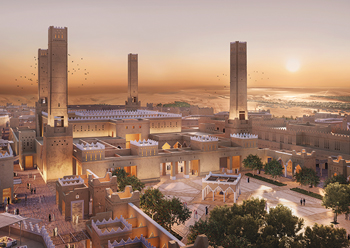Mega deals expected
Saudi Arabia is expected to witness a major uptick in construction activity this year, with the capital city likely to continue to see the bulk of development in the kingdom, according to ABDO KARDOUS, President of Hill International (Middle East).
01 March 2022
Saudi Arabia’s construction market in 2022 will see a significant increase in activity with several more contract awards compared with the previous years.
A prime reason for this is several of the mega projects that were in the design and planning phase have now progressed to tendering and are being awarded to contractors.
This is illustrated by the magnitude of two major contracts placed recently: a joint venture of France’s Bouygues and Saudi Arabia’s Almabani General Contractors was awarded a $1-billion contract by the Qiddiya Investment Company (QIC) for its Six Flags entertainment project; and Italian Salini Impregilo was selected for a $1.06-billion contract to build infrastructure facilities for the Diriyah Square mixed-use district. Both projects are in Riyadh and US-based project and construction management company Hill International believes the capital city will continue to see the bulk of development in the kingdom.
 |
|
Abdo Kardous |
Another difference in 2022 – compared with the previous years – is that the kingdom’s construction market is signalling a strong demand for professionals and qualified contractors, with the scenario getting tighter for qualified resources as well as contractor capacity.
The two large contracts awarded by QIC and Diriyah Gate Development Authority (DGDA) are an indication that going forward the size of the construction contracts will get larger than the usual size for real estate developments and building projects. This excludes major projects like metro, aviation, oil and gas and power and water.
For building projects, the size of each contract is growing and the award of contracts to international companies indicates a growing need for multinational players to increase their footprint and invest in growing capacity inside the kingdom.
There is also an expectation of a shortage of vendors as construction activity picks up.
 |
|
Hill International is also involved on the Riyadh Metro project. |
Source of projects
Even as the government is progressing well with its privatisation and Public Private Privatisation (PPP) programme, Hill expects the prime source of project activity to be the Public Investment Fund (PIF) and associated companies that together will roll out the bulk of construction work.
As economic activity grows, the demand for services has started to increase too. This creates the platform for the private sector to step in and invest in the emerging opportunities like housing, retail, entertainment and hospitality sectors. The PIF is seen to be carrying out the mega projects; while the private sector will be filling in the gaps in associated services.
Whether it is the Red Sea development, Qiddiya, Neom, Diriyah and other Vision 2030 projects, all require significant infrastructure support and this is where the bulk of spending will be rather than traditional public sector projects.
Industry pressure points
It is an industry norm that an increase in project activity puts pressure on the supply chain driving up prices due to a lag in the supply/demand scenario. Hill International expects that prices will increase for a short period as the supply chain capacity will compete with the growing demand. However, the economy of the kingdom is resilient and the private sector is likely to step in at the first opportunity and gradually invest in the supply chain to cover the shortage.
Other potential bottlenecks will be labour and workforce availability. Appropriate work permits will streamline the import of foreign professionals and labour for early kick-start projects. Along with this, the need for higher levels of induction of Saudi workforce will be a challenge in the interim period as local professionals get additional training. Yet another hurdle is the availability of funding. There is limited capital available for the significant pipeline of projects that are under planning and development. This will lead to prioritisation of the planned projects and determine their pace of implementation.
Early involvement
With several new projects planned in the kingdom, Hill International recommends the involvement of operators and end-users at the early design stages to ensure the planned facilities are completed on time and within budget.
Hill’s portfolio of projects in Saudi Arabia is quite diversified with existing clients like the Tatweer Building Company and the Rua Al Madinah Company, and with the US-based project and construction management company being awarded an increasing number of contracts in the Eastern and Western provinces as well as Madinah. Besides, in a joint venture with WSP, called the Riyadh Advanced Metro Project Execution and Delivery (RAMPED), it is the project manager for Package 3 which includes Line 4, Line 5 and Line 6 and covers 67 km of track with 48 km of elevated alignment, 5.5 km tunnel, 22 stations and nearly 13 km of bored tunnel constructed through some of the most congested districts in Riyadh.
On completion, the metro lines will give the city’s planners the opportunity to develop new urban areas.
- Ambitious vision
- Mega deals expected
- Unique heritage hub
- Key deals for entertainment hub
- Trimble helps shape iconic station
- Work starts on $3.7bn Avenues – Riyadh
- Byrne builds on strength as single-source supplier
- Big 5 Saudi set to open doors in the capital
- Al Kifah KRB to launch green concrete



